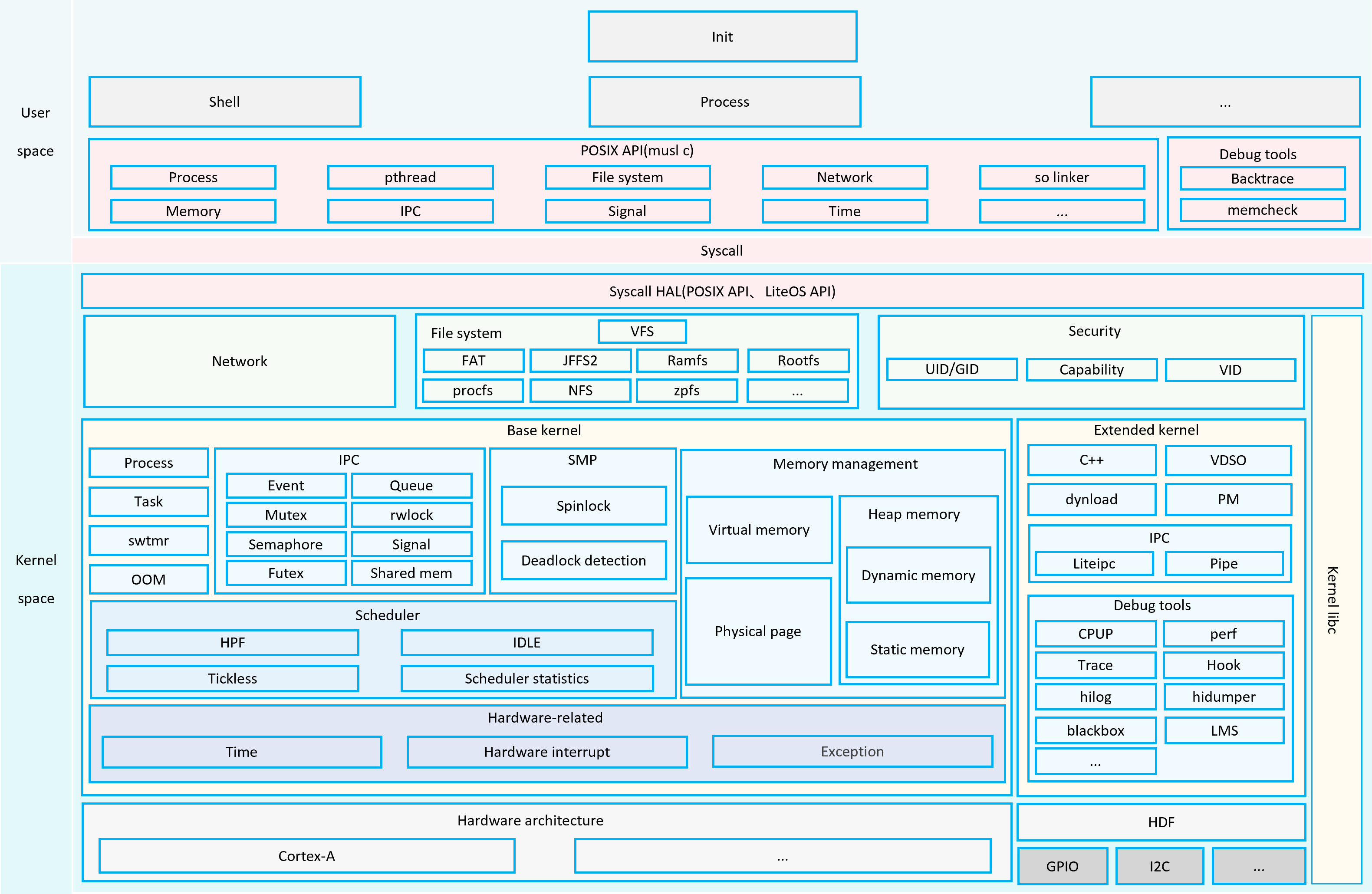BREAKING CHANGE: 支持pid容器对外变更描述: 1.支持pid容器,使用clone(CLONE_NEWPID)创建 2.shell命令 task -a 不再显示线程信息,只显示系统所有进程信息 3.task命令新增参数-p, task -p pid 可查看改进程下的所有线程信息 4.使用LOS_TaskCreateOnly创建任务时, TSK_INIT_PARAM_S中的processID由原来的记录进程ID修改为记录进程控制块PCB Close #I68LVW Signed-off-by: zhushengle <zhushengle@huawei.com> Change-Id: I0895da9099cb285b3195af5e383d0fdeaf5c0087 Change-Id: I46a7642eeee73a4531c241e3ba6290dd302600a7 |
||
|---|---|---|
| .gitee | ||
| apps | ||
| arch | ||
| bsd | ||
| compat | ||
| drivers | ||
| figures | ||
| fs | ||
| kernel | ||
| lib | ||
| net | ||
| platform | ||
| security | ||
| shell | ||
| syscall | ||
| testsuites | ||
| tools | ||
| .gitignore | ||
| BUILD.gn | ||
| CHANGELOG.md | ||
| Kconfig | ||
| LICENSE | ||
| Makefile | ||
| OAT.xml | ||
| README.md | ||
| README_zh-HK.md | ||
| README_zh.md | ||
| build.sh | ||
| bundle.json | ||
| config.mk | ||
| liteos.gni | ||
README.md
LiteOS Cortex-A
- Introduction
- Directory Structure
- Constraints
- Usage
- Preparations
- Source Code Acquisition
- Compilation and Building
- Contribution
- Repositories Involved
Introduction
The OpenHarmony LiteOS Cortex-A is a new-generation kernel developed based on the Huawei LiteOS kernel. Huawei LiteOS is a lightweight operating system OS built for the Internet of Things IoT field. With the rapid development of the IoT industry, OpenHarmony LiteOS Cortex-A brings small-sized, low-power, and high-performance experience and builds a unified and open ecosystem for developers. In addition, it provides rich kernel mechanisms, more comprehensive Portable Operating System Interface POSIX, and a unified driver framework, Hardware Driver Foundation HDF, which offers unified access for device developers and friendly development experience for application developers. Figure 1 shows the architecture of the OpenHarmony LiteOS Cortex-A kernel.
Figure 1 Architecture of the OpenHarmony LiteOS Cortex-A kernel

Directory Structure
/kernel/liteos_a
├── apps # User-space init and shell application programs
├── arch # System architecture, such as ARM
│ └── arm # Code for ARM architecture
├── bsd # Code of the driver and adaptation layer module related to the FreeBSD, such as the USB module
├── compat # Kernel API compatibility
│ └── posix # POSIX APIs
├── drivers # Kernel drivers
│ └── char # Character device
│ ├── mem # Driver for accessing physical input/output (I/O) devices
│ ├── quickstart # APIs for quick start of the system
│ ├── random # Driver for random number generators
│ └── video # Framework of the framebuffer driver
├── fs # File system module, which mainly derives from the NuttX open-source project
│ ├── fat # FAT file system
│ ├── jffs2 # JFFS2 file system
│ ├── include # Header files exposed externally
│ ├── nfs # NFS file system
│ ├── proc # proc file system
│ ├── ramfs # RAMFS file system
│ └── vfs # VFS layer
├── kernel # Kernel modules including the process, memory, and IPC modules
│ ├── base # Basic kernel modules including the scheduling and memory modules
│ ├── common # Common components used by the kernel
│ ├── extended # Extended kernel modules including the dynamic loading, vDSO, and LiteIPC modules
│ ├── include # Header files exposed externally
│ └── user # Init process loading
├── lib # Kernel library
├── net # Network module, which mainly derives from the lwIP open-source project
├── platform # Code for supporting different systems on a chip (SOCs), such as Hi3516D V300
│ ├── hw # Logic code related to clocks and interrupts
│ ├── include # Header files exposed externally
│ └── uart # Logic code related to the serial port
├── platform # Code for supporting different systems on a chip (SOCs), such as Hi3516D V300
├── security # Code related to security features, including process permission management and virtual ID mapping management
├── syscall # System calling
└── tools # Building tools as well as related configuration and code
Constraints
- Programming languages: C and C++
- Applicable development boards: Hi3516D V300
- Hi3516D V300 uses the FAT file system by default.
Usage
OpenHarmony LiteOS Cortex-A supports the Hi3516D V300. You can develop and run your applications based on this development board.
Preparations
You need to set up the compilation environment on Ubuntu.
Source Code Acquisition
Download and decompress a set of source code on a Ubuntu server to acquire the source code.
Compilation and Building
For details about how to develop the first application, see: Developing the First Example Program Running on Hi3516
For compilation, please refer to the compilation instructions.
Contribution
LiteOS-A Kernel Coding Style Guide